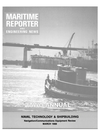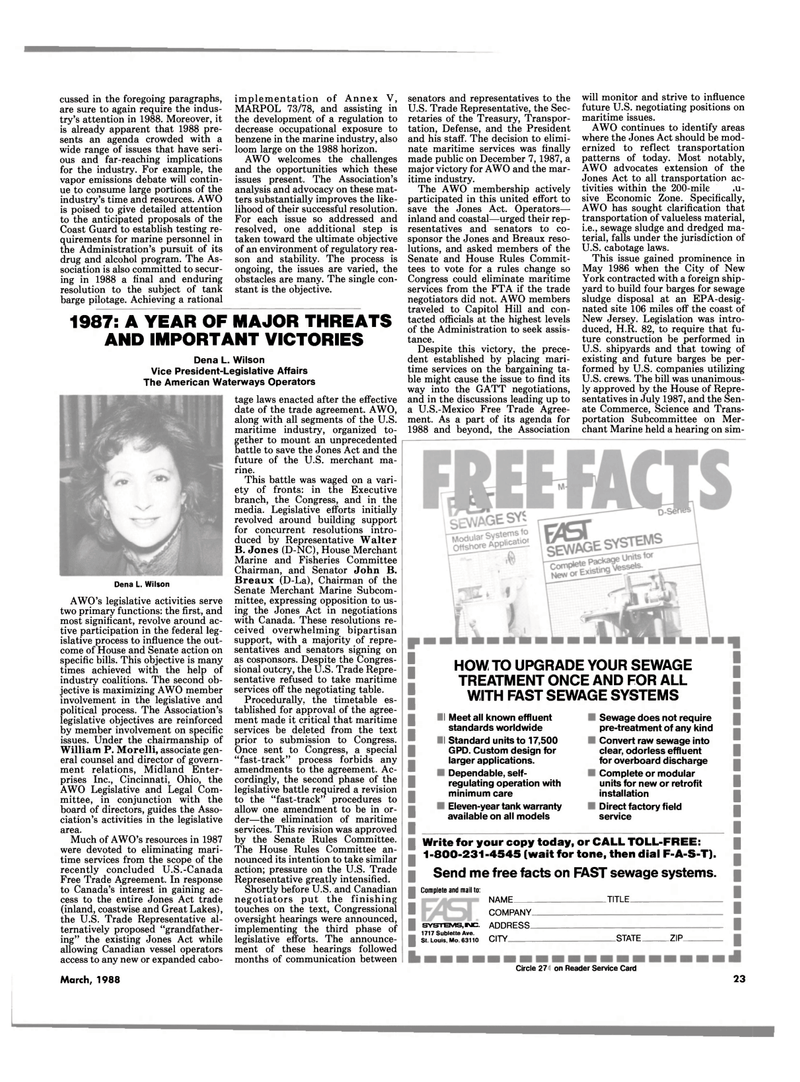
Page 21: of Maritime Reporter Magazine (March 1988)
Read this page in Pdf, Flash or Html5 edition of March 1988 Maritime Reporter Magazine
cussed in the foregoing paragraphs, are sure to again require the indus- try's attention in 1988. Moreover, it is already apparent that 1988 pre- sents an agenda crowded with a wide range of issues that have seri- ous and far-reaching implications for the industry. For example, the vapor emissions debate will contin- ue to consume large portions of the industry's time and resources. AWO is poised to give detailed attention to the anticipated proposals of the
Coast Guard to establish testing re- quirements for marine personnel in the Administration's pursuit of its drug and alcohol program. The As- sociation is also committed to secur- ing in 1988 a final and enduring resolution to the subject of tank barge pilotage. Achieving a rational
AWO's legislative activities serve two primary functions: the first, and most significant, revolve around ac- tive participation in the federal leg- islative process to influence the out- come of House and Senate action on specific bills. This objective is many times achieved with the help of industry coalitions. The second ob- jective is maximizing AWO member involvement in the legislative and political process. The Association's legislative objectives are reinforced by member involvement on specific issues. Under the chairmanship of
William P. Morelli, associate gen- eral counsel and director of govern- ment relations, Midland Enter- prises Inc., Cincinnati, Ohio, the
AWO Legislative and Legal Com- mittee, in conjunction with the board of directors, guides the Asso- ciation's activities in the legislative area.
Much of AWO's resources in 1987 were devoted to eliminating mari- time services from the scope of the recently concluded U.S.-Canada
Free Trade Agreement. In response to Canada's interest in gaining ac- cess to the entire Jones Act trade (inland, coastwise and Great Lakes), the U.S. Trade Representative al- ternatively proposed "grandfather- ing" the existing Jones Act while allowing Canadian vessel operators access to any new or expanded cabo-
March, 1988 implementation of Annex V,
MARPOL 73/78, and assisting in the development of a regulation to decrease occupational exposure to benzene in the marine industry, also loom large on the 1988 horizon.
AWO welcomes the challenges and the opportunities which these issues present. The Association's analysis and advocacy on these mat- ters substantially improves the like- lihood of their successful resolution.
For each issue so addressed and resolved, one additional step is taken toward the ultimate objective of an environment of regulatory rea- son and stability. The process is ongoing, the issues are varied, the obstacles are many. The single con- stant is the objective. tage laws enacted after the effective date of the trade agreement. AWO, along with all segments of the U.S. maritime industry, organized to- gether to mount an unprecedented battle to save the Jones Act and the future of the U.S. merchant ma- rine.
This battle was waged on a vari- ety of fronts: in the Executive branch, the Congress, and in the media. Legislative efforts initially revolved around building support for concurrent resolutions intro- duced by Representative Walter
B. Jones (D-NC), House Merchant
Marine and Fisheries Committee
Chairman, and Senator John B.
Breaux (D-La), Chairman of the
Senate Merchant Marine Subcom- mittee, expressing opposition to us- ing the Jones Act in negotiations with Canada. These resolutions re- ceived overwhelming bipartisan support, with a majority of repre- sentatives and senators signing on as cosponsors. Despite the Congres- sional outcry, the U.S. Trade Repre- sentative refused to take maritime services off the negotiating table.
Procedurally, the timetable es- tablished for approval of the agree- ment made it critical that maritime services be deleted from the text prior to submission to Congress.
Once sent to Congress, a special "fast-track" process forbids any amendments to the agreement. Ac- cordingly, the second phase of the legislative battle required a revision to the "fast-track" procedures to allow one amendment to be in or- der—the elimination of maritime services. This revision was approved by the Senate Rules Committee.
The House Rules Committee an- nounced its intention to take similar action; pressure on the U.S. Trade
Representative greatly intensified.
Shortly before U.S. and Canadian negotiators put the finishing touches on the text, Congressional oversight hearings were announced, implementing the third phase of legislative efforts. The announce- ment of these hearings followed months of communication between senators and representatives to the
U.S. Trade Representative, the Sec- retaries of the Treasury, Transpor- tation, Defense, and the President and his staff. The decision to elimi- nate maritime services was finally made public on December 7, 1987, a major victory for AWO and the mar- itime industry.
The AWO membership actively participated in this united effort to save the Jones Act. Operators— inland and coastal—urged their rep- resentatives and senators to co- sponsor the Jones and Breaux reso- lutions, and asked members of the
Senate and House Rules Commit- tees to vote for a rules change so
Congress could eliminate maritime services from the FTA if the trade negotiators did not. AWO members traveled to Capitol Hill and con- tacted officials at the highest levels of the Administration to seek assis- tance.
Despite this victory, the prece- dent established by placing mari- time services on the bargaining ta- ble might cause the issue to find its way into the GATT negotiations, and in the discussions leading up to a U.S.-Mexico Free Trade Agree- ment. As a part of its agenda for 1988 and beyond, the Association will monitor and strive to influence future U.S. negotiating positions on maritime issues.
AWO continues to identify areas where the Jones Act should be mod- ernized to reflect transportation patterns of today. Most notably,
AWO advocates extension of the
Jones Act to all transportation ac- tivities within the 200-mile >u- sive Economic Zone. Specifically,
AWO has sought clarification that transportation of valueless material, i.e., sewage sludge and dredged ma- terial, falls under the jurisdiction of
U.S. cabotage laws.
This issue gained prominence in
May 1986 when the City of New
York contracted with a foreign ship- yard to build four barges for sewage sludge disposal at an EPA-desig- nated site 106 miles off the coast of
New Jersey. Legislation was intro- duced, H.R. 82, to require that fu- ture construction be performed in
U.S. shipyards and that towing of existing and future barges be per- formed by U.S. companies utilizing
U.S. crews. The bill was unanimous- ly approved by the House of Repre- sentatives in July 1987, and the Sen- ate Commerce, Science and Trans- portation Subcommittee on Mer- chant Marine held a hearing on sim-
HOW TO UPGRADE YOUR SEWAGE
TREATMENT ONCE AND FOR ALL
WITH FAST SEWAGE SYSTEMS
I Meet all known effluent standards worldwide
I Standard units to 17,500
GPD. Custom design for larger applications.
Dependable, self- regulating operation with minimum care
Eleven-year tank warranty available on all models
Sewage does not require pre-treatment of any kind
Convert raw sewage into clear, odorless effluent for overboard discharge
Complete or modular units for new or retrofit installation
Direct factory field service
Write for your copy today, or CALL TOLL-FREE: 1-800-231-4545 (wait for tone, then dial F-A-S-T).
Send me free facts on FAST sewage systems.
Complete and mail to:
SYSTEMS, 1\IC. 1717 Sublette Ave.
St. Louis. Mo. 63110
NAME
COMPANY.
ADDRESS-
CITY .TITLE. .STATE, _ZIP_
Circle 287 on Reader Service Card 23 1987: A YEAR OF MAJOR THREATS
AND IMPORTANT VICTORIES
Dena L. Wilson
Vice President-Legislative Affairs
The American Waterways Operators
Dena L. Wilson

 20
20

 22
22
